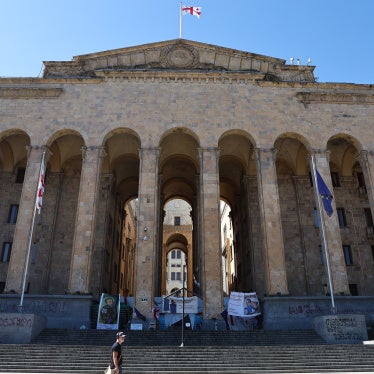Days after his detention, Uzbek police have refused to reveal the whereabouts of 38-year-old Bahodir Hasanov, a religious Muslim who was detained and tortured in 1999 and whose brother and father are religious prisoners.
On Tuesday, July 17, 2000, eyewitnesses saw plain-clothes officers raid the home of Bahodir Hasanov and take him into custody for the fourth time in the past year. Days later, authorities still have failed to notify Hasanov's family of his detention and refused to give persons close to Hasanov any information about his whereabouts. One of Hasanov's acquaintances told Human Rights Watch that a National Security Service (SNB) representative responded to a query by saying, "Find him yourself."
During previous detentions, police brutally beat Bahodir Hasanov; they also severely abused his father and brother, both of whom are in prison. Human Rights Watch fears that Bahodir is in danger of further torture and other mistreatment in detention.
"The first days in police custody are the most dangerous for someone held incommunicado," said Rachel Denber, acting executive director of Human Rights Watch's Europe and Central Asia division. "The international community has to act quickly. They have to tell the Uzbek government to reveal Hasanov's whereabouts and allow him access to a lawyer and his family."
Authorities first detained Bahodir Hasanov in February 1999, when they planted bullets in his home and beat him to force him to confess they were his. According to a highly reliable source close to the case, they pushed him to the ground, kicked him, and pulled his head up by the hair, yelling "Say it, 몀ujahid,' how many times were you in Chechnya?" 멝ujahid' is a term for an Islamic fighter.
Police held him incommunicado for four days at the station and threatened to kill him. Hasanov refused to incriminate himself and was released without being charged.
But in September 1999, officers from the Ministry of Internal Affairs detained Hasanov at his office at the Alliance Francaise, where he is an instructor in French. During interrogation, they punched him in the face and stomach and kicked him in the kidneys. Officers threatened to arrest and rape his wife, and to put his children in an orphanage if he refused to sign a statement incriminating one of his brothers. Authorities held Hasanov for 17 days on a trumped-up administrative charge뾵ithout notifying his family of his whereabouts뾞nd then released him. Two months later, in November 1999, police detained him again, failed to inform his family of his whereabouts, and then released him.
The Hasanov family, whose members are pious Muslims, is one of many targeted in the government's campaign of punishing families for the alleged misdeeds of their members. The campaign was launched in 1999, when Minister of Internal Affairs Zokiron Almatov announced that fathers would pay for the "sins"of their sons. Hasanov's younger brother Ismail, 27, and his 70-year-old father are both in prison on charges that are clearly motivated by their religious practices.
On November 18, police arrested Bahodir Hasanov's father on charges of possessing leaflets printed by the banned Islamic organization Hizb ut-Tahrir; eyewitnesses say police themselves planted the leaflets. During interrogation, according to sources close to the case, the elder Hasanov heard screams coming from the next room. Officers took Hasanov to the room, where he reportedly saw his younger son, Ismail, strung up by his ankles, being dropped on his head and beaten by police. Police told the elderly man that they could do anything they wanted with his son, even kill him, and no one would know. Ismail Hasanov's father agreed to sign a confession to put an end to the torture.
Police later brought Ismail before his father, who had also been beaten. They threatened to continue to beat the elder Hasanov unless Ismail signed a confession, which he did.
But authorities did not release the elder Hasanov. On February 16, 2000, the Tashkent Regional Court convicted the 70-year-old man to three years in prison on charges of anti-constitutional activity, based solely on the leaflets supposedly found in his house. The elder Hasanov, a pious Muslim with no connections to Hizb ut-Tahrir, denied possession of the leaflets and insisted police conducted the search without a warrant and that they fabricated evidence. He even pointed out in the courtroom the officer who had put the leaflets in his home. According to those present at the trial, the judge paid no heed.
In Karshi prison, authorities allegedly treated Hasanov severely; they beat him and other prisoners convicted of anti-constitutional activities, labeling them "enemies of the people." His three-year sentence was extended by six months on charges that he violated internal prison rules by not shaving his beard, a symbol of piety, and not removing his skullcap while passing a guard.
Ismail Hasanov was accused of Islamic extremism and convicted in August 1999 of anti-state activities. Authorities included Ismail Hasanov in a new case against those suspected of affiliation with an alleged terrorist incident in the Yangiabad area of Uzbekistan, which took place in November 1999, when Hasanov was already in prison. Nonetheless, he was charged with having learned karate and studied Islam since 1997 with one of the alleged terrorists who died at the scene, and sentenced to 25 years in prison on terrorism charges. Human Rights Watch monitored his trial; no material evidence incriminating Hasanov was brought forth at trial or in the indictment. Hasanov denied involved in any kind of violence or anti-state activity.






